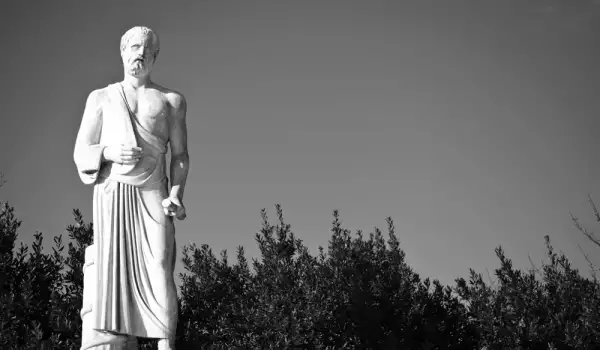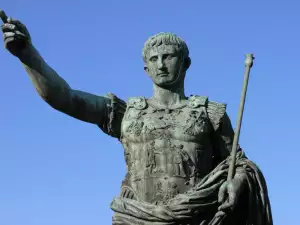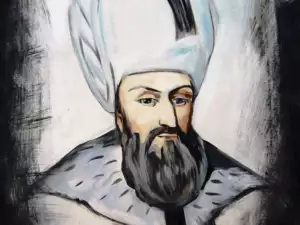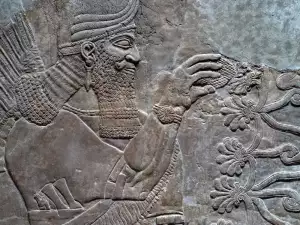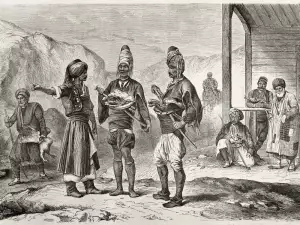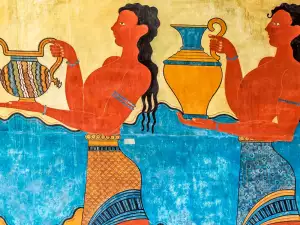If you've decided to read this article, titled The History of Hippocrates, we're probably going to disappoint you a bit, because very little is really known about him. It is shrouded in mysticism and based on conjecture rather than proven historical data. However, we will try to shed some light on the life of this man, also known as the Father of Medicine.
Hippocrates was born in 460 BC. (or about this year) on the island of Kos, a Greek island located very close to the Turkish resort we know today as Bodrum. He grew up as part of the Asclepiades. It is a society of physicians bearing the name of Asclepius, known from the time of Homer, who pass down their medical knowledge from generation to generation, binding themselves by oath to continue this.
Hippocrates inherited his initial medical knowledge from his father, the physician Heraclitus, as well as from the entire society of Asclepiades. Hippocrates is known to have traveled extensively in his lifetime in search of new medical knowledge and is also known to have sons to whom he passed it on to.
At the time when Hippocrates lived, there were two main schools of medicine - the school of the island of Kos and the school of the island of Cnidus. While the school on the island of Cnidus considered the state of human health in a scheme, the School of Kos had a strictly individual approach.
What Hippocrates contributed to its rise was that he insisted that the illnesses of the sick should be considered individually and that he did not believe that they were caused by evil spirits or magic. As was considered at the time.
Hippocrates was convinced that impaired human health could be due either to specific atmospheric influences (cold weather, heat, etc.), or to have a hereditary character, or to have a personal character, taking the personal character under attention especially to what the patient eats, whether they are subjected to heavy physical work, etc. And although he considered medicine to be an art, thanks to him it was separated as an independent science.
Hippocrates died around 370 BC. in Larissa, leaving behind about 70 scientific works. There is no way to know today how many of them are really his and how many of his followers, but his enormous contribution to medicine is indisputable!
Life is short, craft takes time, opportunity is fleeting, experience is misleading, and judgment is difficult. This is a famous statement of Hippocrates, whose work influenced medical thought, in for more than 2, 000 years, an influence comparable to Aristotle's influence on philosophy.
Hippocrates became famous early. It is said that one day he was summoned by the inhabitants of the city of Abderos in Thrace to take care of the philosopher Democritus, who laughed at everything and was considered mad. Hippocrates disembarks, finds Democritus under a plane tree, near a stream, surrounded by books and animals he has dissected and then realizes that the philosopher's laughter, far from being a sign of madness, is a sign of wisdom.
Hippocrates between medicine and philosophy
The relationship of medicine to philosophy as it appears in the Hippocratean treatises is varied, but for many commentators the reaction against philosophical medicine is considered Hippocrates' great merit. At first the art of medicine was considered a part of philosophy.
For this reason we find many philosophers, among whom the most famous are Pythagoras, Empedocles, and Democritus, known in medicine. But it was Hippocrates of Cos, a pupil of Democritus - according to some - the first who deserves to be known to posterity - he separated medicine from philosophy. From that moment, the medical art began to turn little by little into a science. But let's not forget that a good doctor is also a philosopher.
What else should we know about the life of Hippocrates? In his youth, in order to free himself from strained family ties and deepen his medical knowledge, he went to Egypt, where healers had reached a high level of specialization in the medical-surgical field. Returning to Kos in 438 BC, Hippocrates devoted himself to rebuilding the city's medical school, developing a series of insights useful to the medical profession, such as compliance with hygiene rules, dialogue with the patient in the so-called "incubation" rooms or studying the environment and the impact of climate on people.
Hippocrates believed that the body should be treated as a whole, not just as a series of parts. He was the first to accurately describe the symptoms of the disease, including symptoms of pneumonia, epilepsy in children.
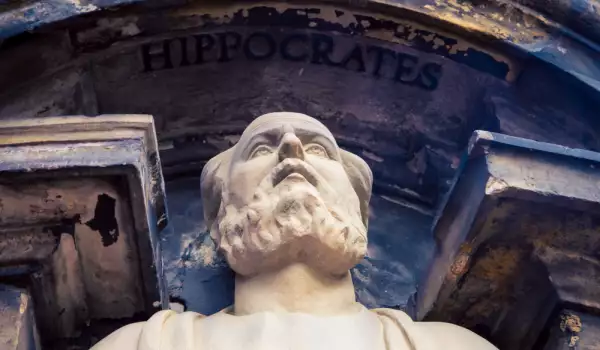
In the vision of Hippocrates, the doctor was supposed to help the sick directly, to know their habits and by carefully examining their bodies, not to hide behind incomprehensible divine theories. He believed that the body becomes ill when there is an imbalance in the four substances of the human body: black bile, yellow bile, blood and lymph. Each of these substances is directly related to an element of the Universe and to an atmospheric quality.
Therefore, the goal of medicine is to restore balance. Another Hippocratean concept is that every disease reaches a state of "crisis" after which it either regresses or worsens, eventually leading to the patient's death. He also claimed that the human body has the power to heal or restore the balance between the four moods, which requires rest, healthy diet, fresh air and good hygiene.
Hippocrates was the first to characterize diseases as acute, chronic, endemic and epidemic. It incorporated a number of new medical terms, including relapse, crisis, resolution and exacerbation.
The Hippocratic Corpus, for which Hippocrates is known, is a collection of over 60 works, although some of them were actually written by his students.
Hippocrates was the first documented thoracic surgeon and his findings are still valid today.
He paid great attention to cleaning the patient and used water and wine to clean the wounds. The most important achievement of the School of Hippocrates, however, was that it made physicians keep a clear record of observations and approaches to each patient, with the idea that these records could be useful for future generations.
This way, he laid the foundations of clinical medicine. After several observations, he believed that diseases could be closely related to family heredity, natural environment, lifestyle and food habits.
His clinical methods were used until the seventeenth century, when medicine began to develop again as a science. In addition to a modern view of medicine based on careful observation of the patient and his environment, Hippocrates imparts a profound moral lesson through a text known as the Hippocratic Oath. Although some modern researchers dispute whether this work was actually written by Hippocrates, or rather by his followers, one thing is certain - it has great power.
The Hippocratic Oath enumerates the moral norms that every doctor must observe in the exercise of his profession:
- the obligation to pass on the acquired knowledge to pupils and students who took the same oath to allow medicine to progress;
- the obligation to do everything possible to cure each patient;
- prohibition of the use of substances and treatments that may harm the patient;
- observance of professional secrecy: the doctor may not reveal to another person what he heard or saw while visiting the patient.
Wise thoughts from Hippocrates
- As it became clear, Hippocrates is a man who is extremely wise. He has traveled, read and practiced a lot. To this we also owe his recorded wisdoms, which will always be relevant. Here are some of them;
- The soul is the same in all living beings, although the body of each is different;
- The natural forces within us are the true healers of diseases;
- If we could give each man the proper amount of food and exercise, not too little and not too much, we would find the safest way to health;
- A doctor must be able to tell the antecedents, know the present, and foretell the future - must mediate these things and have two special objects in view of disease and that is, to do good or to do no harm.
